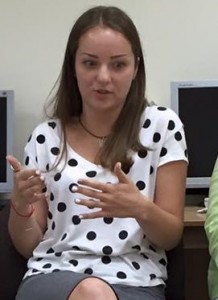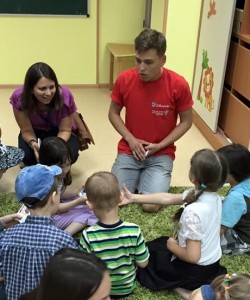I’m writing this week’s message from Dnepropetrovsk as I prepare to make my way back to Boston, after spending a week representing the Boston Jewish community on an important Jewish Federations of North America mission. I hope you’ve been following my posts throughout the trip on Facebook. I’ll admit, I’ve been struggling with what to take away from my third visit to this community I’ve come to love.
There is so much despair here. There are worries about escalation of the conflict with Russia and over Ukraine’s ability to defeat corruption and overcome the economic crisis. There is despair in the families we’ve met on home visits— single mothers, often disabled themselves, caring for disabled teens, not at all clear what will happen to those kids after they are gone. There are internally displaced people who have no immediate hope of returning to their homes in Donetsk, but who are also not ready to let go of all they left behind to make Aliyah.
What to make of all this?
I want to tell you about two young people I met.
 At the Jewish Agency in Dnepropetrovsk we met a young woman, Katya, who spoke English remarkably well. She told us that she studied English at the Dnep Jewish day school, and that from 2008-2012 she participated in the English language camp run by Prozdor at Hebrew College through the Boston partnership, a program where teens from our community help kids in Dnepropetrovsk learn English in an immersive camp experience. Katya recently completed her university degree in public affairs and is now working for the Jewish Agency, helping prepare families in Ukraine to make Aliyah.
At the Jewish Agency in Dnepropetrovsk we met a young woman, Katya, who spoke English remarkably well. She told us that she studied English at the Dnep Jewish day school, and that from 2008-2012 she participated in the English language camp run by Prozdor at Hebrew College through the Boston partnership, a program where teens from our community help kids in Dnepropetrovsk learn English in an immersive camp experience. Katya recently completed her university degree in public affairs and is now working for the Jewish Agency, helping prepare families in Ukraine to make Aliyah.
During my last visit a year ago, Yoni Leifer, director of the American Jewish Joint Distribution Committee (JDC) in Dnep, showed me their new but largely empty space in the Menorah Center where they would soon be moving the Solomonika JCC, a project supported by CJP’s targeted funding for JDC programs in Dnep. This week, the two of us walked through a loving vibrant institution, filled with after school programs, arts courses, dance classes, and community members meeting to plan summer programs. In one room, the children of displaced families from the conflict zone were in a social program to help them heal from their trauma. Yarick, a teenager from Dnepropetrovsk, was working with these little children, helping them with their projects, guiding them through activities on the play rug. As I watched him, I began to cry with joy.
Katya and Yarick are two of the many young people from the Dnepropetrovsk Jewish community that we in Boston have helped over the years. Katya honed her American quality English in one of our programs. Now she is a young Jewish professional giving back to her community by helping others to connect to Israel. Yarick found a home at the JCC and he is giving back as well, helping other Jews who have come to his community through crisis and chaos.
Katya and Yarick are who I am thinking about as I leave Dnepropetrovsk. Over 23 years, in partnership with the Dnep Kehillah and with the JDC, we in Boston have helped build the foundations of a new generation of young Jews, committed to others and to the Jewish values and the community we sought to revitalize in the Former Soviet Union when we started this journey.
Katya and Yarick give me hope. They show me what is possible when we imagine a glorious future, when we dream and commit to building the institutions and programs we need in order to transmit our values to the next generation.
Thanks to Katya and Yarick, I end this visit with hope for what is possible for Dnepropetrovsk, for the Jewish people, for Ukraine… if only we dare dream it and then build it.
Shabbat Shalom,
Jeremy



